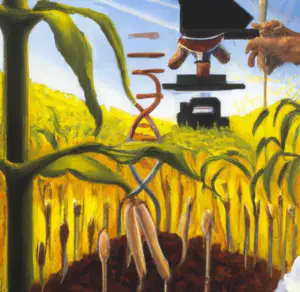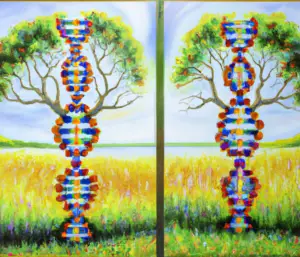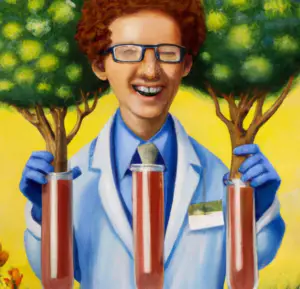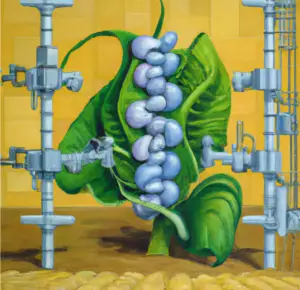Biotechnology is applied science that utilizes living organisms and biological processes to develop or modify products and tools. It has been used since ancient times and has seen significant advances since then, fueled by advancements in related fields such as genetics, molecular biology, and engineering. This article is written to explore the current state of biotechnology to understand its vast potential.
Biotechnology refers to applying scientific techniques such as genetic engineering and molecular biology for industrial or commercial purposes. It merges medicine with technology, creating an interdisciplinary field offering massive benefits in health care, food production, energy efficiency, sustainable development, and environmental protection.
Table of Contents
Biotechnology dates back to early human civilizations, where selective breeding was used to improve domesticated plants and animals. Biotechnology’s modern history starts with biomedical research’s advent during the 19th century, which triggered innovations in biology-related technologies. Biotechnological advancements gained momentum as more advanced techniques were developed in fields like microbiology, genetic engineering, and biochemistry. In recent years, developments such as gene cloning have enabled us to modify organelles through genetic manipulation for specific purposes.

This article provides readers with an overview of biotechnology—its definition, brief history, current state, and applications—and its potential implications on our lives. It also looks at how this promising field can help address global challenges faced by humanity today, such as climate change and food insecurity.
Biotechnology is a multidisciplinary field that involves the use of biological processes or substances for specific purposes. It combines various components such as biology, genetics, molecular biology, engineering, and physical sciences such as chemistry and physics. The main goal of biotechnology is to manipulate living organisms or their components for industrial or commercial use to produce valuable products such as food products and medicines. This process can involve genetic engineering, introducing new genes into existing cells or organelles to alter their function or characteristics.
Biotechnology has several applications across different industries, including agriculture, medical practice, industry development, environmental protection, and more. Each application involves different tools and techniques depending on the area it is applied to.
Agricultural Biotechnology
Agricultural biotechnology refers to gene manipulation to produce better crop yields by enhancing resistance against pests or diseases; increasing nutrient content; improving quality traits such as taste or shelf life; or creating new varieties better adapted for particular climates or conditions. Examples include:
- Genetically modified (GM) crops have been modified through gene splicing techniques.
- Plant-made pharmaceuticals, which engineering plants produce with foreign genes so they can produce pharmaceutical compounds.
- Genomics-assisted breeding uses genomics data from DNA sequencing technologies to breed improved crop varieties faster than traditional selection methods.

Medical Biotechnology
Medical biotechnology refers to the application of biological procedures for developing medical treatments for diseases through genetic modification techniques like gene therapy systems (using engineered viruses). Other examples include monoclonal antibodies, which are antibody molecules made from artificially altered cells; tissue engineering, which involves culturing human cells outside the body in suitable substrates; stem cell therapy which uses stem cells generated from adult tissues for regenerative medicine purposes; immunotherapies which involve therapies explicitly designed for immune system modulation at the cellular level; pharmacogenetics/genomic approaches that help personalize medication doses based on genomic information from individual patients among others.
Industrial Biotechnology
Industrial biotechnology refers to the application of biological processes at an industrial scale to create goods or services that would otherwise be impractical due to being generated on their own using conventional technologies like chemical synthesis techniques. Examples include biofuel production using microbial processes instead of traditional oil refining techniques; production of enzymes used in detergent manufacture using transgenic microorganisms (such as yeast); bioremediation works where microorganisms are used instead of toxic chemicals for cleaning up contaminated sites, among other activities involving renewable resources conversion like producing basic chemicals/products from biomass inputs like sugarcane juices or cellulosic wastes found in agricultural fields, etc.,
Environmental Biotechnology
Environmental biotechnology utilizes certain microorganisms (or parts thereof) to protect Earth’s environment from harm due to excessive pollution levels caused by human activities such as industrial manufacturing etc.; examples include the utilization of phytoplankton species capable of breaking down hydrocarbons found in oil spills during marine transportation accidents where regular cleanup efforts not possible. Furthermore, certain microbial species even evolved, producing antibiotic compounds naturally helpful in controlling pathogenic bacteria populations responsible for causing water pollution near shorelines. Lastly, transgenic crop varieties engineered to reduce the carbon footprint generated during farming activities aim to reduce global warming effects due to greenhouse gas emissions.

Pros of Biotechnology

- Improves crop yields and food production
- Helps in disease diagnosis and treatment
- Enables production of lifesaving medicines
- Helps in understanding genetic disorders
- Improves understanding of biology and genetics
- Enhances industrial processes and bioremediation
- Provides new and renewable energy sources
- Decreases dependence on fossil fuels
- Improving environmental sustainability
- Increases food security
- Promotes sustainable agriculture
- Offers new career opportunities
- Improves animal health and productivity
- Helps in creating new vaccines
- Improves human health and wellness
- Increases understanding of human evolution and diversity
- Enhances quality of life for people with disabilities
- Promotes medical research and drug discovery
- Supports personalized medicine
- Promotes the conservation of biodiversity
- Helps in fighting against climate change
- Reduces the cost of healthcare
- Supports the development of new technologies
- Increases agricultural productivity and profitability
- Supports food processing and packaging industries
Improves crop yields and food production
Biotechnology enhances crops through genetic engineering, making them more resistant to pests, diseases, and droughts while also increasing yields. This means more food can be produced with fewer resources, so it helps to reduce hunger and poverty worldwide.
Helps in disease diagnosis and treatment
Through biotechnology, we can better understand diseases, diagnose them sooner, and develop treatments faster. This means faster access to lifesaving medicines for those who need them most.
Enables production of lifesaving medicines
Many lifesaving drugs have been developed through biotechnology, such as insulin for diabetics or anti-cancer therapies like Gleevec or Herceptin. These treatments wouldn’t be possible without biotechnology techniques such as gene splicing or cloning.
Helps in understanding genetic disorders
With advances in biotechnology, doctors can now identify genetic markers for certain illnesses, allowing for early detection and prevention of many severe conditions. This includes cystic fibrosis, thalassemia, and sickle cell anemia, which can cause lifelong health complications if not detected early on.
Improves understanding of biology and genetics
The knowledge gained from biotechnology research is invaluable when it comes to an understanding of how cells operate within our bodies and how genes work together to create proteins that make up all living organisms. This helps inform new treatments that would otherwise remain unexplored due to a lack of knowledge in introductory biology, genetics, protein structure, and more complex topics related to these fields.
Enhances industrial processes and bioremediation
Biotechnology is also widely used in industry to make processes faster, more efficient, and less expensive. Based on genetic engineering, this technology can be used to create new enzymes with specific functions or to improve existing ones, allowing for a wide range of applications from biodegradable plastics and greener chemical processes to bioremediation which helps clean up the environment.
Provides new and renewable energy sources
Through biotechnology, researchers are looking for ways to generate sustainable energy from renewable sources such as algae or plant matter. This type of energy does not rely on traditional fossil fuels, so it is considered more environmentally friendly.
Decreases dependence on fossil fuels
By finding new ways to generate energy, we can reduce our reliance on traditional fossil fuels, which emit harmful greenhouse gases into the atmosphere and contribute to climate change. Biotechnology can help us move away from these energy sources and towards cleaner power generation with less environmental impact.
Improving environmental sustainability
Biotechnology can also help us sustainably manage natural resources like soil, forests, and water for future generations to preserve ecosystems for future use. This helps us achieve a balance between technological advancement and the conservation of the planet’s valuable resources.
Increases food security
biotechnology can help increase food security by providing an ample supply of nutritious foods in areas where conventional agriculture may not be thriving due to limited resources or harsh climates while reducing waste within the food system by extending shelf life and improving farming practices.
Promotes sustainable agriculture
Biotechnology can help farmers make their operations more sustainable by increasing crop yields, reducing inputs and costs, and improving soil health with genetically modified organisms (GMOs). This increases food security and helps farmers become more resilient to climate change, allowing them to continue farming sustainably for generations.
Offers new career opportunities
With biotechnology advancements come a wide range of new career opportunities in many different fields, such as research, production, marketing, and healthcare. This means those with knowledge and experience in this area can find employment in exciting and rewarding roles.
Improves animal health and productivity
Biotechnology is increasingly used to improve animal health through genetic engineering or selective breeding, providing better nutrition while also increasing productivity in livestock industries where animals are bred for food or other products.
Helps in creating new vaccines
One of the most important applications of biotechnology is the development of vaccines which help protect us from infectious diseases like measles or polio by introducing weakened versions of these pathogens into our bodies so that we develop immunity against them without actually becoming ill.
Improves human health and wellness
biotechnology has enabled researchers to further their understanding of human biology and genetics, which leads to groundbreaking treatments for conditions like cancer or Alzheimer’s disease. This ultimately improves our quality of life and allows us to live longer, healthier lives.
Increases understanding of human evolution and diversity
Biotechnology has opened up new possibilities for studying human evolution and diversity by allowing researchers to map out the complete human genome. This gives us a better understanding of our origins and how we are connected, which can help inform decision-making in conservation, health, and education.
Enhances quality of life for people with disabilities
Along with medical breakthroughs, biotechnology also supports assistive technologies such as prosthetics, improving the quality of life for those with physical or cognitive impairments. These devices have become increasingly sophisticated, allowing them to be tailored to an individual’s needs while providing greater mobility and independence.
Promotes medical research and drug discovery
Biotechnology allows us to explore previously uncharted domains in medicine, such as gene therapy, where scientists can alter genes to cure diseases, or genetic engineering, which helps create novel medicines that are more effective than traditional drugs. This type of research is essential to develop better treatments for illnesses.
Supports personalized medicine
In addition, biotechnology is paving the way for personalized medicine, where treatments are tailored to an individual based on their genetic makeup, lifestyle choices, and health history – this means that treatment plans are more successful as they are tailored specifically for a person’s needs rather than being generic ‘one size fits all solutions.
Promotes the conservation of biodiversity
Lastly, researchers use biotechnology to understand ecosystems better so that they can conserve biodiversity at a local, regional, and global scale – this includes preserving species as well as protecting habitats or whole ecosystems from destruction or damage caused by human activities like deforestation or pollution.
Helps in fighting against climate change
Biotechnology is playing an increasingly important role in the fight against climate change by developing techniques to reduce emissions and promote renewable energy sources such as biofuels. This helps us move towards a more sustainable future while reducing our reliance on fossil fuels which are significant contributors to global warming.
Reduces the cost of healthcare
By utilizing biotechnology, healthcare costs can be reduced by providing cheaper and more effective treatments tailored to the individual. This means patients can receive quality care at a lower price – allowing them to access the medical attention they need without financial strain.
Supports the development of new technologies
Biotechnology also paves the way for groundbreaking technological innovations in many different sectors, such as manufacturing or consumer electronics, which are essential for driving economic growth and creating jobs.
Increases agricultural productivity and profitability
Advances in biotechnology have enabled farmers to increase crop yields with fewer inputs, resulting in more profitable farming operations and reducing environmental impacts like nutrient runoff and soil erosion due to increased land use efficiency.
Supports food processing and packaging industries
biotechnology has helped revolutionize food processing and packaging industries by introducing new technologies such as gene editing or nanoscale food packaging, which make it easier for companies to produce safe and nutritious food products that last longer on shelves or in transport containers – increasing efficiency while also enabling healthier eating choices for consumers.
Cons of Biotechnology

- Ethical Concerns Regarding Genetic Modification
- Possibility of Unintended Consequences
- Risk of Contamination of Non-Genetically Modified Organisms
- Potential Health Risks to Consumers
- Threat to Biodiversity and Ecological Balance
- Economic and Social Impacts on Farmers
- Lack of Regulation and Control
- Possibility of Monopolies in Seed and Agricultural Industries
- Potential Harm to Non-Target Species
- Risk of Bioterrorism
- High Cost of Biotechnology Products
- Limited Availability of Biotechnology Products in Developing Countries
- Fear of Loss of Traditional Agriculture and Farming Practices
- Lack of Public Trust in Biotechnology
- Potential Harm to Soil and Water Resources
- Possible Negative Impacts on International Trade
- Unequal Distribution of Benefits from Biotechnology
- Unintended Harm to Beneficial Insects and Animals
- Limited Funding for Independent Research
- Potential for Conflict Between Nations Over Biotechnology
- Lack of Awareness and Understanding Among the General Public
- Difficulty in Predicting the Long-Term Effects of Biotechnology
- Need for Skilled and Trained Personnel to Handle Biotechnology
- Limited Ability to Recall Genetically Modified Products
- Possibility of Loss of Traditional Knowledge and Cultural Heritage
Ethical Concerns Regarding Genetic Modification
The genetic manipulation of organisms can have moral implications, raising questions such as who has the right to modify life and what authority should be given to regulate this activity.
Possibility of Unintended Consequences
Genetic modification and engineering are still relatively new technologies, and we cannot predict with certainty the long-term impacts they may have on the environment or human health. There is a chance that unforeseen consequences may arise from their use.
Risk of Contamination of Non-Genetically Modified Organisms
Genetically modified organisms can hybridize or crossbreed with their wild counterparts, meaning there is a risk of contamination by GM material. This could potentially lead to reduced biodiversity and adverse ecological effects.
Potential Health Risks to Consumers
The safety effects on consumers from consuming products made using genetically modified ingredients are not yet thoroughly studied or understood. Potential health hazards could exist if GM foods are consumed in high quantities for extended periods.
Threat to Biodiversity and Ecological Balance
Introducing new species into an ecosystem can upset existing balances, posing a severe threat to biodiversity and endangering native species which cannot compete in their new habitat.
Economic and Social Impacts on Farmers
Large corporations can patent genetic modifications, giving them control over seed pricing and limiting farmers’ choices while increasing costs. This could leave some farmers unable to compete in an increasingly monopolized market or with fewer economic opportunities than before.
Lack of Regulation and Control
Many countries lack appropriate regulations regarding biotechnology development and its applications, leaving a growing industry largely unregulated, which could lead to ethical violations or environmental damage if left unchecked.
Possibility of Monopolies in Seed and Agricultural Industries
When corporations hold patents on genetically modified crop varieties, they monopolize seed production, increasing farmers’ prices while reducing competition in the marketplace.
Potential Harm to Non-Target Species
Careless application of pesticides or other chemicals used in biotechnology applications can cause unwanted harm to beneficial organisms such as pollinators or other beneficial insects like ladybugs which may have been unintended targets of these treatments.
Risk of Bioterrorism
Biotechnologies carries a significant risk related to malicious uses that have the potential for widespread destruction if exposed by mischievous actors who intend to harm others through disease outbreaks or the release of hazardous materials into the environment.
High Cost of Biotechnology Products
Many biotechnology products are expensive and cost-prohibitive for those with limited resources, leaving them unable to access potential life-altering treatments.
Limited Availability of Biotechnology Products in Developing Countries
Biotechnology products are often only available in developed countries, limiting access to those without sufficient economic means or technology infrastructure.
Fear of Loss of Traditional Agriculture and Farming Practices
The introduction of genetically modified crops can threaten traditional farming and agricultural techniques, which may prove more resilient or yield higher production rates, leading some to worry about losing traditional agricultural knowledge and practices.
Lack of Public Trust in Biotechnology
Negative press and a lack of public understanding can lead to mistrust in biotechnological developments, making it difficult for scientists to communicate the benefits they could bring without facing heavy criticism from the general public.
Potential Harm to Soil and Water Resources
Pesticides or other chemicals used in biotechnological applications can contaminate soil and water resources if not adequately monitored or regulated, causing long-term environmental damage while posing health risks to humans who consume contaminated sources.
Possible Negative Impacts on International Trade
Different countries have different regulations and compliance standards regarding biotechnologies, creating a potential barrier to international trade between those countries with differing requirements. Predictive models may also create barriers that prevent developing nations from accessing new technologies that could benefit their citizens.
Unequal Distribution of Benefits from Biotechnology
Wealthier countries may have more access to innovations such as genetic engineering techniques which could provide them with economic advantages over poorer countries without such access. This can create an unequal distribution of benefits from biotechnological advances leading to further economic disparity between different nations.
Unintended Harm to Beneficial Insects and Animals
Careless application of pesticides or other chemicals used in biotechnological applications can cause harm to beneficial organisms such as pollinators or other beneficial insects like ladybugs which may have been unintended targets of these treatments.
Limited Funding for Independent Research
Restrictions on funding levels mean that independent research is often underfunded compared to corporate research projects, which enjoy more significant financial resources than academic studies due to government incentives. Due mainly to financial constraints, this can make it difficult for independent researchers not employed by significant corporations to conduct successful research projects on specific aspects of biotechnology developments.
Potential for Conflict Between Nations Over Biotechnology
Countries have begun attempting to patent certain biological materials such as plants and animals, creating a potential conflict between nations over whose patents will ultimately apply worldwide, leading to potentially contentious disputes over rights arising from this technology’s use between competing states.
Lack of Awareness and Understanding Among the General Public
Biotechnology is a relatively new field, and as such, most people are unaware of how it works or its potential implications. This means that people can make uninformed decisions about the use of biotechnology and even propagate misinformation about it.
Difficulty in Predicting the Long-Term Effects of Biotechnology
Although biotechnology can create revolutionary changes, it is difficult to predict what those changes might be over the long term. It is also difficult to monitor the effects of biotechnological products on humans, animals, and the environment due to ethical considerations and other obstacles.
Need for Skilled and Trained Personnel to Handle Biotechnology
Biotechnology requires specialized skills, knowledge, and training to be used effectively. Without skilled personnel knowledgeable in this technology, it can lead to risky outcomes resulting from mistakes or misuse of biotechnological processes.
Limited Ability to Recall Genetically Modified Products
Due to their complex nature, it is often challenging for companies to recall genetically modified products if something goes wrong or if there are unexpected consequences. This can lead to serious health problems from products that are not easily rectified by recalls alone.
Possibility of Loss of Traditional Knowledge and Cultural Heritage
Biotechnology can hurt traditional knowledge systems surrounding plants, animals, and food production due to the introduction of new practices which are unfamiliar or unfamiliarly used with local species or varieties. This could lead to a loss of cultural heritage associated with traditional practices passed down through generations.

Final thoughts
Biotechnology can revolutionize society, bringing increased food production, new medical treatments, and improved environmental sustainability. While these advantages are undeniable, it is essential to consider its use’s potential ethical, health, and unforeseen challenges. To ensure biotechnology’s responsible implementation, ongoing collaboration between scientists, lawmakers, and citizens is essential. This dialogue should foster an informed, balanced perspective that offers insight into its advantages and risks. Only then can we unlock biotechnology’s full potential.
https://www.bio.org/what-biotechnology
https://www.usda.gov/topics/biotechnology
